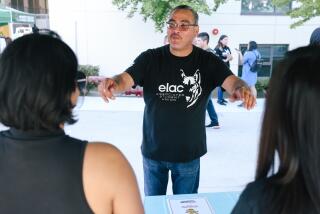Internet Can Be Blessing or Curse for Researchers--It’s Highly Addictive : Academe: Clusters of large computers linked to high-speed long-distance phone lines are radically changing the way professors and students work.
- Share via
When E.J. Crane, 28, a postdoctoral fellow at Bowman Gray Medical School in North Carolina, wants to know how fast a particular enzyme reaction occurs, he can calculate it on his Macintosh computer. But that would take 24 hours.
Instead, Crane uses the Mac to sign onto the international collection of computer networks known as the Internet and hook up with a more powerful computer at a hospital in Winston-Salem, N.C. On it, he can perform the same calculation in a minute--using a program made available on Internet by Washington University in St. Louis.
At other times, Crane signs onto Internet to send messages to his brother in Minnesota, discuss ideas with other biochemists across the country and copy three-dimensional images of protein molecules from a national database in Upton, N.Y.
The Internet--clusters of large computers linked to high-speed long-distance phone lines--is radically changing the way professors and students carry out their missions. By making all kinds of information available to anyone with an Internet account, the network has begun to blur the differences between big universities--with their big computers and big libraries--and smaller institutions. The computer links also encourage long-distance collaboration, allowing isolated scholars and academic newcomers to tap into the collective wisdom in their fields.
Internet users say titles, sex, race and other distinctions fade, because on Internet, everyone is just an address. “It’s a great leveler,” said University of Richmond professor Elizabeth Gruner. “Anyone can ask anything . . . and anyone can respond.”
But universal, round-the-clock access makes Internet a mixed blessing. Highly addictive, it encourages users to spend hours communicating via computer with distant friends and colleagues rather than with the person down the hall. Many users, under the guise of participating in academic discussions, spend hours reading and responding to obvious, repetitive inquiries.
Internet often encourages scholars to ask for help rather than carry out their own research, and some professors are worried that it will devalue individual accomplishment and encourage intellectual laziness.
“My initial optimism in this technology has faded considerably,” said Robert Jay, art department chairman at the University of Hawaii. “Green graduate students . . . now seem to believe they can ask the rest of the (people on the network) to do the most basic bibliographic research for them.”
Some are concerned that Internet’s capacity for transferring large files at no cost may encourage the proliferation of low-quality electronic journals that publish papers rejected by more established publications.
For better or worse, however, Internet has embedded itself in academic life. Consider these developments:
* Trotter Hardy, a law professor at the College of William and Mary, has organized two academic conferences entirely on Internet. For each, he chose a topic--one was the impact of electronic mail on teaching law--and invited as many as 25 people to participate. They exchanged electronic messages for three weeks, then Hardy compiled and sent out a transcript, entirely on Internet. For professors without time or travel money, such conferences help compensate for a lack of mobility.
* Harvard University’s government department has created a special Internet file to help its job-hunting graduate students. With a quick Internet query, recruiters at other universities can get copies of the students’ resumes, their published articles and sections of their dissertations. “I know of three cases where recruiters learned of our students from our (Internet) service and invited them to apply before the positions were officially announced,” said government professor Gary King, who set up the system.
* When Solveig C. Robinson, a University of Chicago graduate student, stalled in her research into “Shafts,” an obscure 19th-Century publication, she posted a query on “Victoria,” a list of about 600 scholars interested in the period. “Within 48 hours, I had a couple of responses that put me in touch with a woman from Texas who had done some work on ‘Shafts’ . . . and we pooled our notes,” Robinson said. “Since she hadn’t yet published anything, there was really no other way for me to know about her.”
* Rochester Institute of Technology mathematician Stanislaw P. Radziszowski has spent 3 1/2 years working on complex logic problems with an Australian colleague, one of only a few mathematicians who had the necessary expertise in algorithms and computer programs. The pair, who are in the forefront of programming computers to do formal reasoning, have met in person only three times and talked on the phone perhaps four times, but they communicate via electronic mail three or four times a day.
Without Internet, “our joint work would have been rather impossible,” Radziszowski said. “Our computers very often work simultaneously on the same problem. . . . They use the same data, and we check each other’s results by computers.”
* Many universities offer courses to long-distance learners on Internet. Students carry on class discussions, work on group projects and submit their papers entirely on-line.
In the last two or three years, Internet has become ubiquitous in the academic community: Although non-academics usually pay for access, most universities offer free accounts to students, faculty and staff members. Many academics now turn first to e-mail and Internet instead of the telephone when they need to reach someone.
Scholars simply type up a message of any length, address it, push the send button and whoosh, the electronic letter goes out on the information highway. The next time the recipient signs on, the message will be there, waiting to be read.





